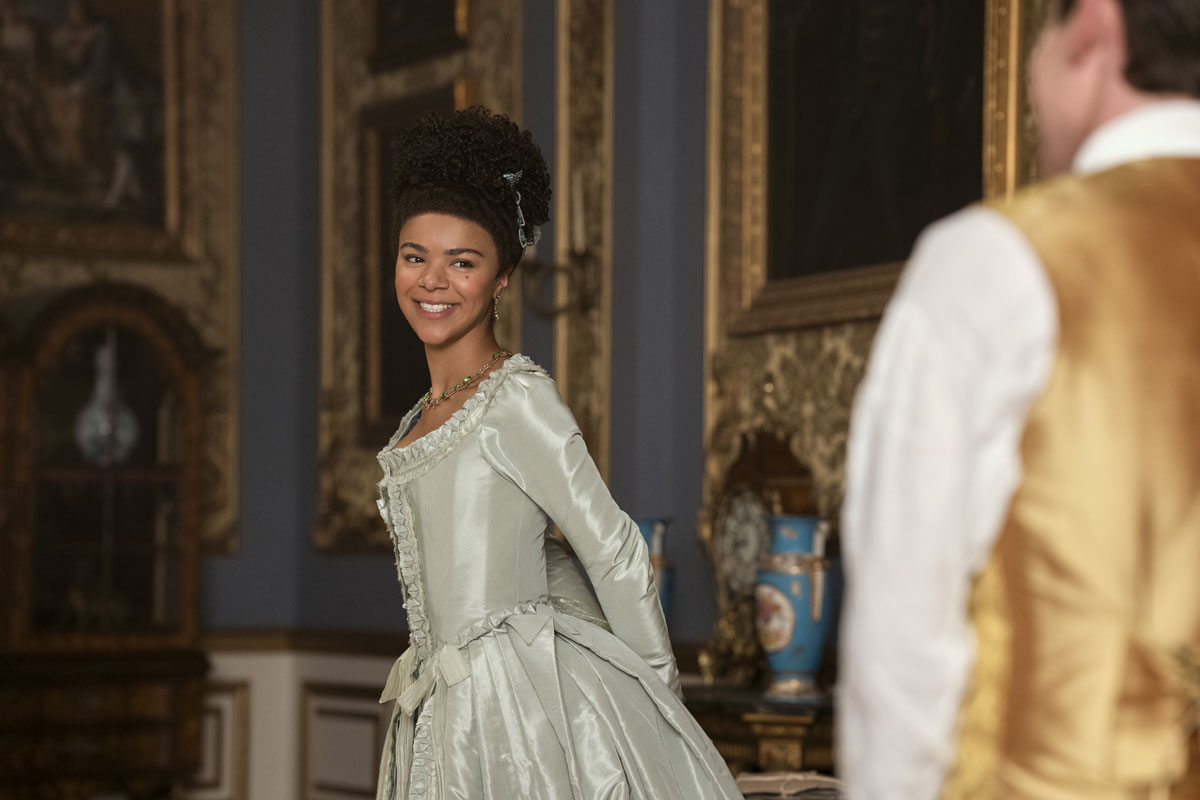
The Bridgerton prequel series focused on Queen Charlotte’s marriage to King George III premiered last week. India Amarteifio is the 21-year-old Black British actress who plays the young Queen Charlotte. She trained as a dancer, made her way into theatre and appeared in several West End productions, and transitioned to television. Queen Charlotte is India’s first leading role and she was profiled by Town & Country ahead of the premiere, where she talked about race in the world of Bridgerton and modern day parallels.
In the first episode of Queen Charlotte: A Bridgerton Story, a young Queen Charlotte, then Sophia Charlotte of Mecklenburg-Strelitz, is presented to Princess Augusta for the first time. Augusta (a steely Michelle Fairley, of Game of Thrones fame) circles Charlotte (newcomer India Amarteifio, perfectly cast) menacingly as she inspects her future daughter-in-law. After asking about her teeth and hands, and commenting on her child-bearing hips, Augusta licks her fingers and reaches out to wipe Charlotte’s skin. Charlotte, offended, stares at her, but says nothing.
Queen Charlotte, out today, is a prequel meant to give context to the world of Bridgerton; it’s intended both for viewers who are existing fans of the original series, and those who haven’t watched Bridgerton. The show, Amarteifio tells Town & Country, “explores so many different journeys that you just don’t expect at all; things that you’re like, ‘Is she about to say that? Oh my gosh, she is!’ Or, ‘Are they about to reference her? Oh my gosh, they are.’ We’re not shy.” Hot-button issues, like ones related to race, Amarteifio continues, are “spoken about in direct [terms]; it will be written out for you.’ It’s very brazen and quite risky, but that’s exciting—and how cool to be a part of.”
Augusta wiping Charlotte’s skin is just one of many scenes where Charlotte’s Blackness factors into the plot; the show seeks to explain how the world of Bridgerton came to be, thanks to the marriage of Charlotte and George. In doing so, Queen Charlotte feels more responsive, in a way, to modern-day issues of race and racism. Amarteifio is glad they’re showing these types of racial microgressions, plain and simple, in Queen Charlotte. “How society treats Black women is still not where we need to be at, and the fact that Shonda’s making it such a pivotal theme and idea in the show is going to speak to a lot of people who that still happens to,” says Amarteifio. “It’s horrible to watch and it’s uncomfortable. But again, we don’t make change unless we create conversation. This is going to create conversation—one way or another.”
Amarteifio says she wasn’t thinking too much about the Duke and Duchess of Sussex as she worked on Queen Charlotte, but calls it “crazy” that “we’re able to draw similar parallels to things that are happening in real life to a show that’s set 400 years ago.” She adds, “The fact that we’re still having the same conversations just shows how far we’ve got to go.”
The scene in question was very shocking, but I was actually glad they went there instead of just sticking to the weird undertones as in the first season of Bridgerton with the Black cousin being the “pregnant hussy” and that suitor asking to see her teeth. I’ve long been saying that the “colorblind casting” in Shondaland shows is surface-level and sometimes problematic when it unintentionally perpetuates harmful stereotypes. I haven’t finished all the prequel eps, but I do appreciate that it is actually exploring the implications and issues of a diverse British society in that era instead of just glossing over it like the main series and her other shows do. As for the other stuff India says, she’s completely right. We still do have a long way to go and it’s important to show microaggressions that make people of color feel “other” because some people may not get it unless it’s right in front of their face and sometimes not even then. I found India’s comments about the modern day royals to be a bit coy — she’s a Black British woman doing this show in the Sussex era, how could she not think about it — but the British press is crazy so I don’t blame her for excusing herself from that narrative.
Photos credit Liam Daniel/Netflix, Getty Images for Netflix and via Instagram

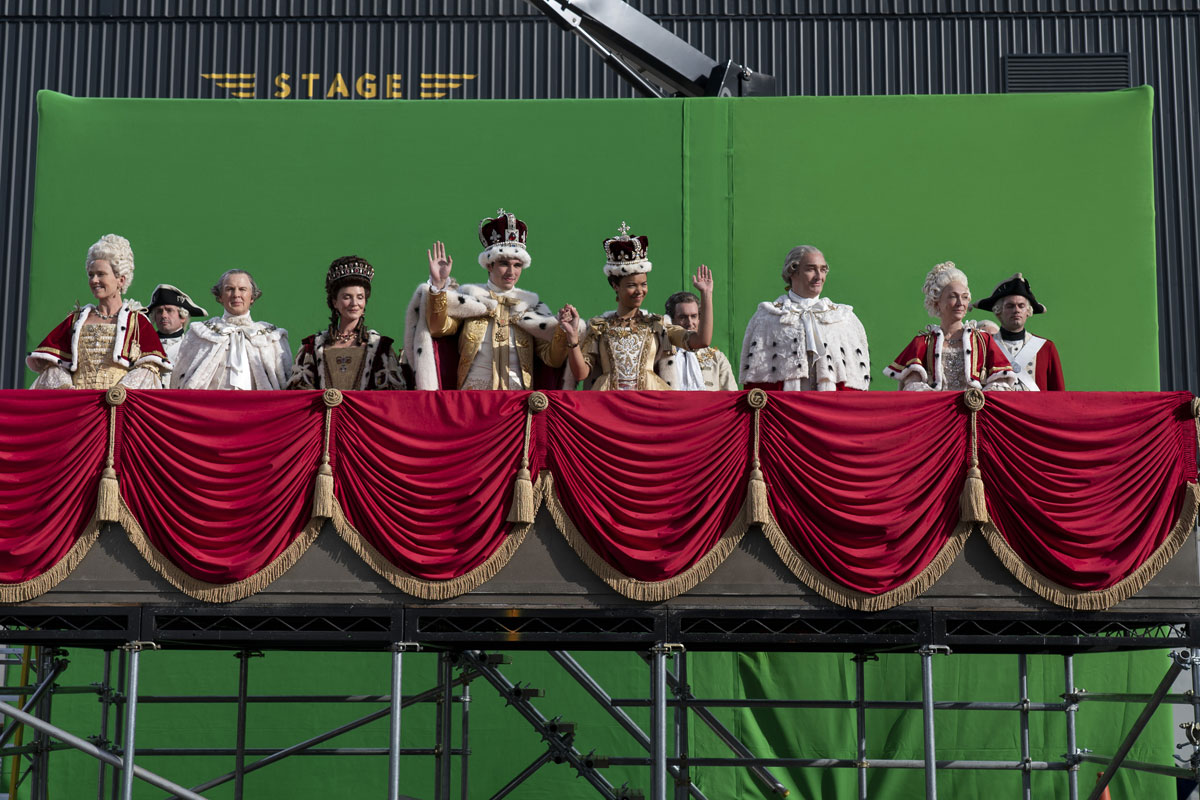
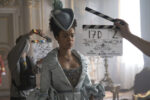

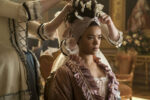

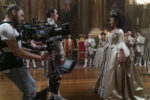
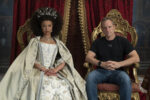
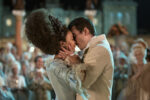
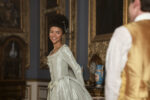
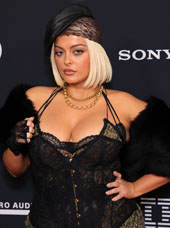
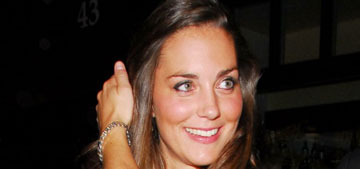
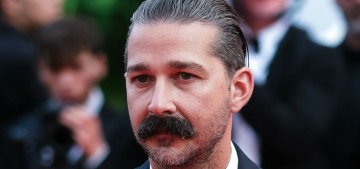


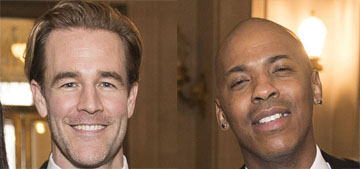




I just finished watching all of it and loved every minute of it. I did keep making the parallels between what has happened back then to what is happening now and yes I thought of the Sussexes. The truths that were explored were just what is needed. I highly recommend watching.
She is so good in Queen Charlotte. I’m not hugely into the bridgerton world but I started watching and the cast is really good. Shonda really knows how to cast people who are hella charismatic. I was okay with what she said about the Sussexes. She said it was crazy we’re having the same conversations, which it is.
I like her also and enjoyed her performance, but we aren’t having the same conversations between now and 400 years ago. She’s rewriting history by saying that.
Four hundred years ago, Black people didn’t even count as “3/4 of a person.”
Bridgerton is historical fantasy, not historical fiction.
Loved India and Corey, but for me the stand out star was Arsema Thomas who played young lady Danbury.
“It’s very brazen and quite risky.”
For the UK.
Actually brazen and risky would have been addressing the Transatlantic slave trade which was positively flourishing during that time period.
This is the same King George of US Revolutionary War fame, I laughed out loud when he started talking about “duty” and being “a king for the people.” The French Revolution didnt happen until 1799, Charlotte and George got married in 1761. There was no “king for the people” then; they were never a king or queen “for the people.”
The costumes were pretty and the actors did a good job for what they were given, but they didn’t pull anything off regarding the race issues because George III was not someone who did anything to help non white people and slavery was in full swing during his entire reign.
Just calling it the Great Experiment seemed very off and it’s impossible to buy that centuries of seeing non white people as inhuman would suddenly change attitudes because someone threw a nice ball. That would be a pure fantasy. And that’s ignoring the class system in the UK that exists pretty strongly today.
So if they wanted to go with the fantasy route, then why try for realism with all the torture treatment and then the awful stuff Lady Danbury had to deal with with her husband.
Again the actors are not to blame, but the entire premise was just confused. Either go all fantasy and pretend racial issues don’t exist and make a colour blind cast, or be real about what racism entails. Especially when slavery existed in high gear all over the British empire.
Like the coronation of Charles, there was no joy in this series. Which is the problem when you try to make a fairytale out of real life British royalty.
💯
Binge watched it on Con A Nation day, I think it’s great, my favourite of the Bridgerverse so far, the young actors are outstanding and the multilayered issues dealt with so brilliantly – the music,the costumes, the wigs……
I agree about the colorblind casting thing. It was a fun little experiment that made white people feel better about not leaving spaces for POC in their projects, but that era is over, as far as I’m concerned. I dislike the first season of Bridgerton, was okay with the second, and feel much more positively about this one, though I wished they’d done more with Charlotte’s kids in the present–maybe they needed another episode or two.
I appreciated their choice to “go there” and discuss the issues of race in historical fiction, and that they did a little less whitewashing than normal. I was especially touched by the mental health part, though. A lot to unpack.
#ThatsNotOkay The last two sentences in your post. Same here.
Of course she steered clear of that narrative. If those emotionally challenged hedgehogs who call themselves the “British press” can make Biden “pro-Sussex”, then there isn’t anyone they can’t far and feather with their unhinged nonsense.
I actually enjoyed the Queen Charlotte miniseries much better than the 2 Bridgerton miniseries. The casting, acting, and story line was great, and has enough real history to make it even more interesting.
“The scene in question was very shocking, but I was actually glad they went there instead of just sticking to the weird undertones as in the first season of Bridgerton with the Black cousin being the “pregnant hussy” and that suitor asking to see her teeth.”
The treatment of Marina is the very reason I noped out of Bridgerton. I hated it. HATED IT! Woo! Even now I’m getting pissy thinking about how Marina was treated and had her life destroyed by Lady Whistledown/Penelope. I don’t care if she did it for Colin. I hate they wrote a desperate, heartsick young woman as manipulative and deserving of being shunned by the ton.
Thrilled to hear Queen Charlotte addresses race far better than Bridgerton.
I’m very excited to watch this! Planning to binge next weekend!
This was the King, Queen and coronation I watched on May 6th. “Queen Charlotte” has better costumes, jewelry, wit, and oodles of charm, charisma, and empathy. The chemistry between all the actors crackles onscreen! Whoever did the casting for this prequel deserves all the awards, the acting by the young cast was excellent. I hope there is a Season 2, even though this is a limited series. There is just the right amount of characters to give each one enough screen time/story arcs and make you feel invested in them and what happens to them. I want to see more of Arsema Thomas as young Lady Danbury becoming more of a Grande Dame in the haute ton.
SLIGHT SPOILERS AHEAD………I think the story and some of the character development would have benefitted from 8 episodes instead of merely 6. It felt like they rushed the ending to wrap things up. Certain plots amd character impacts would have landed more emphatically if they’d allowed a bit more time to breathe. Two more episodes would also have shown Queen Charlotte exercising her power more fully than just the hint of it. They also never really explained the motivation for Princess Augusta in pushing The Great Experiment (was it only to find George a wife?) while still trying to erase or downplay Charlotte’s skin colour in history (i.e. the portrait).